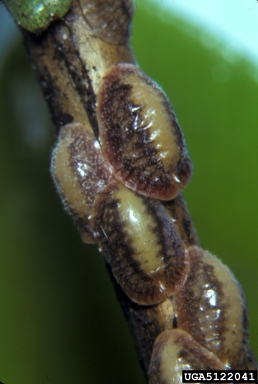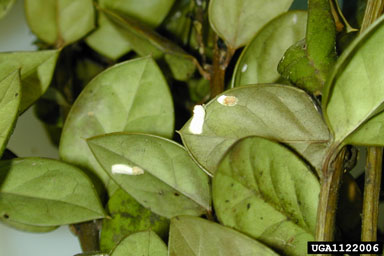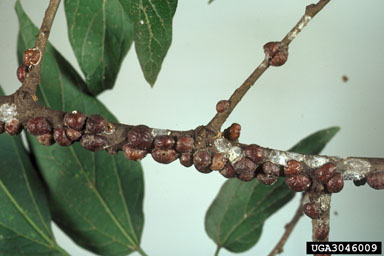
Our arborists are seeing a lot of soft scale on clients’ properties this July. Because of the mild winter and wet spring, soft scale populations are higher than usual and are causing problems for many homeowners.
Scale is a general term to describe a group of tiny insects that attach themselves to trees and shrubs to feed off of the sap the plants produce. The two main types of tree scale are armored scale and soft scale.
Soft scale, which we will be covering in this article, are often round or oval and 1/8 to 1/2 inch in diameter. Soft scale, unlike armored scale, produce honeydew – a sap-like substance we’ve talked about before. If left untreated scale populations can get worse year after year and severely damage your tree over time.
Signs & Symptoms of Soft Scale
- leaf yellowing
- stunted growth
- dieback
- raised bumps on twigs and branches
- honeydew
- sooty mold
- premature leaf drop
Soft Scale Common to the DC Metro Area
A variety of different soft scales are common throughout the DC Metro Area. Below we’ve outlined the most common and have included pictures to help you spot Soft Scale on your trees and shrubs.
Azalea Bark Scale
Azalea Bark Scale, Eriococcus azaleas, was discovered in 1881 and is a major yearly pest for Azaleas, Rhododendrons, and Huckleberries. Although the pest usually does not kill the host tree, it causes aesthetic damage, weakens the tree, and can cause honeydew and sooty mold to develop.
Targets: Azaleas, Rhododendron, Huckleberry, Andromeda, Hawthorn, Popular, & Willow.
Learn more about Azalea Bark Scale
Lecanium Scale
Lecanium scale is a group of common soft scale insects that feed on the sap from shade trees and woody ornamentals. If left uncontrolled, one or two major infestations can kill your tree.
Currently, these insects are in their crawler stage feeding on the sap of the tree’s leaves. They will stay in this stage throughout the summer damaging your trees. As fall approaches, the scale will move back to the branches and develop a protective shell. In this stage, they are brown and turtle-shaped about 1/6-1/8 inch in size.
Targets: Maples, Oaks, Linden, and Birch.
Learn more about Lecanium Scale
Cottony Camellia Scale

Photo Credit: United States National Collection of Scale Insects Photographs , USDA Agricultural Research Service, Bugwood.org

Photo Credit:Eric R. Day, Virginia Polytechnic Institute and State University, Bugwood.org
Also known as Cottony Taxus scale, Cottony Camellia Scale is a soft scale that creates a lot of honeydew which often leads to sooty mold. Although the pest usually does not kill the host tree, it causes aesthetic damage and weakens the tree making it susceptible to other deadly diseases and insects.
Targets: camellia, holly, yew, euonymus, sweetbox, maple, beautyberry, jasmine, mulberry, and hydrangea.
Managing Soft Scale Infestations
Prevention: Scale, like most insects, is more likely to feed on stressed trees. Maintaining the health and vigor of your trees can help protect against scale infestation. You can maintain the health of your tree through routine pruning, bio-stimulant applications, and seasonal sprays.
Treatment: Although Scale can be damaging and hard to get rid of, professional Arborists can help stop them in their tracks and prevent them from destroying your trees & shrubs through a specialized treatment program. Specialized treatment programs will most likely include horticulture oils or insecticides and will be tailored to the type of scale infestation, your landscape, and other factors.
Natural Treatment: One of the more interesting and eco-friendly treatments to combat scale is to use beneficial insects to combat the infestation or to stop it from reoccurring next year.
If you think your trees might have some type of soft scale, we can help! Call us at 703.573.3029 to book an appointment or book through our online booking program.




